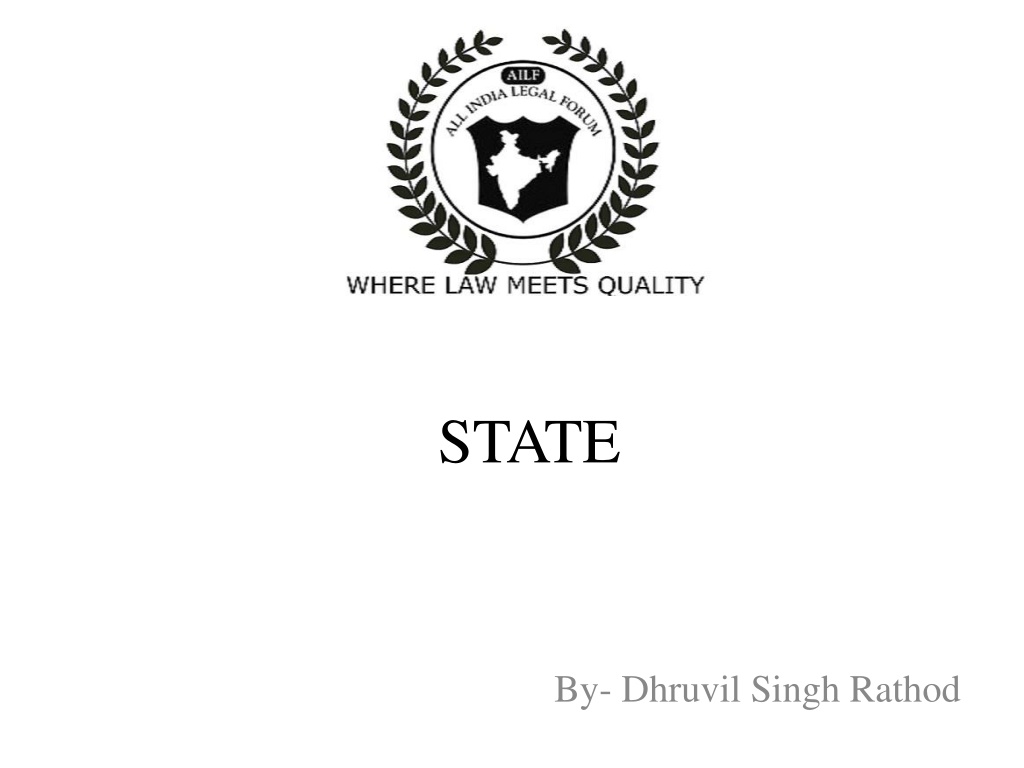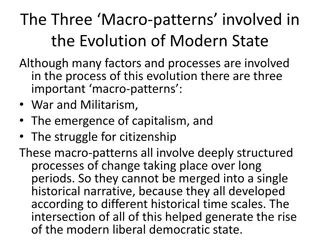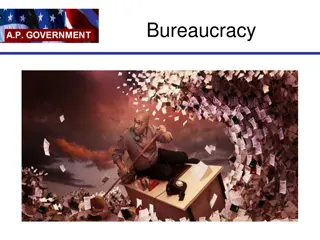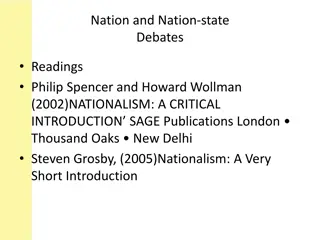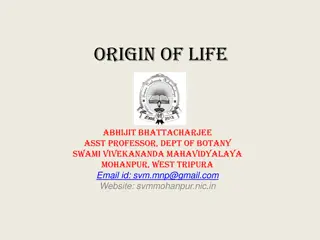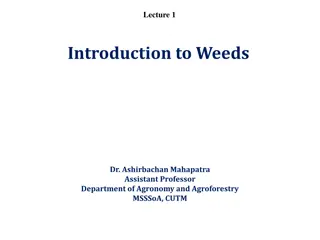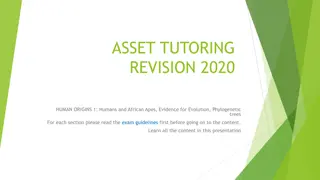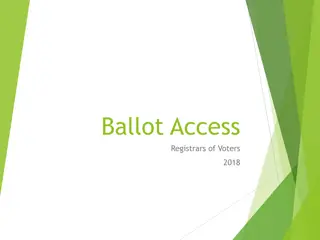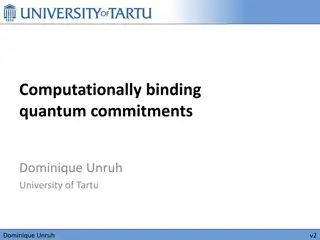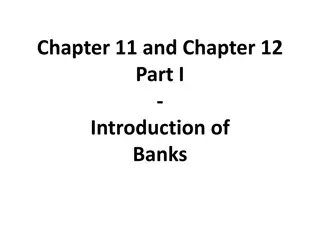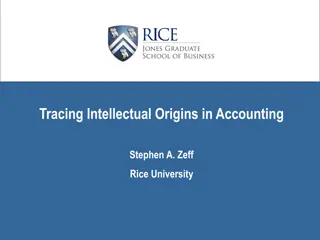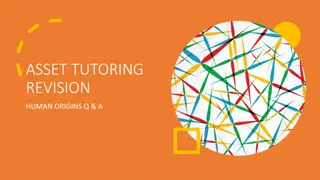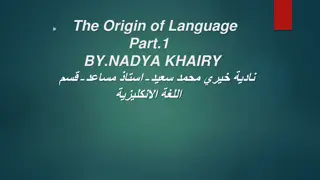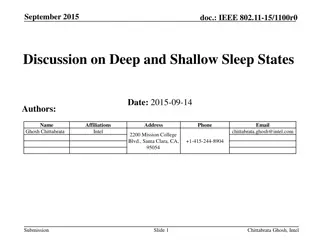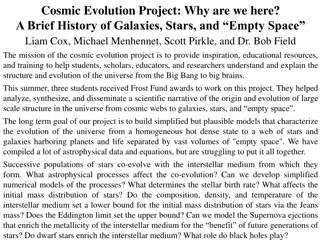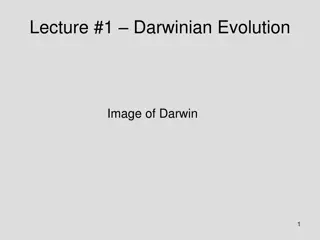Understanding the State: Definitions, Origins, and Evolution
A state is a complex and powerful social institution, yet its exact definition remains debated. Various scholars, including Woodrow Wilson, Aristotle, and Garner, offer different perspectives on what constitutes a state. The concept of the state dates back to ancient civilizations, emerging from the centralization of power. However, it was only in relatively modern times that states replaced stateless forms of political organization. Explore the evolution and significance of states throughout history.
Download Presentation

Please find below an Image/Link to download the presentation.
The content on the website is provided AS IS for your information and personal use only. It may not be sold, licensed, or shared on other websites without obtaining consent from the author. Download presentation by click this link. If you encounter any issues during the download, it is possible that the publisher has removed the file from their server.
E N D
Presentation Transcript
STATE By- Dhruvil Singh Rathod
Introduction A state is a polity. It is the universal and most powerful of all social institutions. But there is no academically agreed definition of the state. Academics have fought for years but failed to unanimously decide a single definition of the state. Though a widely used definition of state is given by the German sociologist Max Weber, state is a polity that maintains a monopoly on the legitimate use of violence . Many other scholars had gave different definitions of the state .
Definitions of the State According to Woodrow Wilson, State is a people organized for law within a definite territory. According to Aristotle the state as union of families and villages having for its end a perfect and self sufficing life by which it meant a happy and good life . According to Burgess the state is a particular portion of mankind viewed as an organized unit. Sidgwick defined the state as State is a combination or association of persons in the form of government and governed and united together into a politically organized people of a definite territory.
According to Garner, State is a community of people live in a definite form of territory free of external control and possessing an organized government to which people show habitual agreement. Prof. Laski defines state as a territorial society divided into government and subjects whose relationships are determined by the exercise of supreme coercive power.
Origin of the state The concept of state exist from ancient times. Whenever there was a scope of centralization of power, a state emerged. The earliest known states were created in the Mesopotamia, Egypt, India, Mesoamerica, China, the Andes, and others. Most of these states were created because of population and resources i.e. people gathered around the primary resources (water, food) which led to creation of society on those locations which further led to creation of state or stateless state (not an actually state but performing some of the functions of state). Though the concept of state was not clear at that time and each state differed from another in many ways.
It was only in relatively modern times that the concept of state was generalised and since than the states have almost completely displaced alternative "stateless" forms of political organization of societies all over the globe. Roving bands of hunter-gatherers and even fairly sizable and complex tribal societies based on herding or agriculture have existed without any full-time specialized state organization, and these "stateless" forms of political organization have in fact prevailed for all of the prehistory and much of the history of the human species and civilization.
Components of state based on its importance
The Elements of State Physical bases of State: Population Territory Political bases of the State: Government Sovereignty
Population It is the people who make the state and without people, there is no state. Population is essential component for the existence of a state. Greek scholars believed that for the smooth functioning of the state, the population should neither be too big nor too small. According to Plato the ideal number for a state would be 5040. According to Aristotle the number should be neither too large nor too small. It should be large enough to be self sufficing and small enough to be well governed.
Based on their theories Greek scholars created small states like Athens and Sparta which they believed were ideal states with ideal population. While in the present day, states are highly populated. States like India and China have population over a billion people. This shows how the understanding of the state has changed through the time .
Territory The second component is territory. A state cannot exist without a fixed territory. Because population of the state need a territory to live and organize themselves socially, culturally and politically. In earlier times, the lands were conquered and territories of the states kept varying. And the territory of the states did not included water and air(space above the land). But in present times, the territory of the state is fixed and includes land, water and air. The modern states differ in their sizes. Territory is necessary for citizenship. As in the case of population, no definite size with regard to extent of area of the state can be fixed. There are small and big states.
Modern states provides security and fundamental rights to its population in its territory. Prof. Elliott states that territorial sovereignty or the Superiority of state overall within its boundaries and complete freedom from external control has been a fundamental principle of the modern state life . This means that the modern states may vary in size but they provide same freedom and follow same principle within its territories.
Government The next component is Government. It is the third element of the state. There can be no state without government. Government is the working agency of the state. It is the political organization of the state. It takes decision for the population of the state. It may be elected by the population or given the power by birth. Prof. Appadorai defined government as the agency through which the force of the State is formulated, expressed and realized. The government make laws and enforce those laws for well-being of the citizens. Thus, it is the highest authority of the state.
Sovereignty The fourth component of the state is sovereignty. The word sovereignty means supreme and final legal authority above and beyond which no legal power exists. Sovereignty can further be divided into two aspects : 1) Internal sovereignty 2) External sovereignty
Internal sovereignty means that the State is supreme over all its citizens, and associations i.e. State can make laws for its population, it can implement those laws and no citizen is supreme to the state or the law of the states. External sovereignty means that the state is independent and free from foreign or outside control. And it is not bound to follow any other state in any matter and can act freely for the benefit of its citizens.
Conclusion State is a highly disputed concept among the scholars and it is far from well defined. The meaning of the state has varied throughout the time but still, it exists and plays a vital role in human civilization and human existence.
